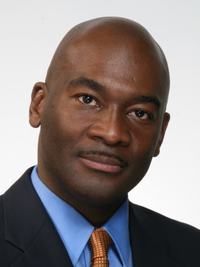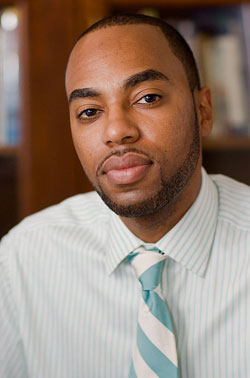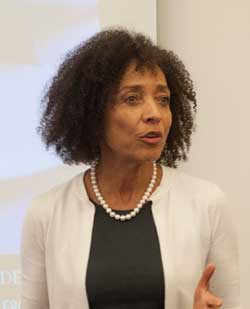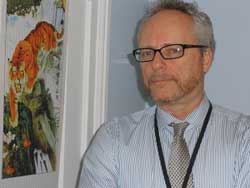Filed Under > Curriculum
Conducting the Orchestra Instead of Fiddling While Rome Burns
At TC's annual Superintendents Work Conference, a call for bold innovation from the district podium
By Siddhartha Mitter
A fall-off in student performance during middleschool is a fairly common issue nationwide. But while other districts have responded by assigning more homework and increasing drill-and-kill test prep, leadership in White Plains, N.Y., has taken a radical approach: starting next year all White Plains sixth graders will attend a single campus dedicated to their grade.
“We know kids make big decisions in their lives in sixth grade,” White Plains schools chief Chris Clouet told an audience of fellow superintendents at TC last week. “Who they are, can they do it, are they up to it, will they start to disengage. So we decided to focus on them as a group.”
The need for district leaders to think creatively – particularly by finding new ways to meet learners on their turf -- was a key theme at the 69th Superintendents Work Conference, held at TC on July 26-28. Or as Clouet, a TC adjunct professor who earned his Ed.D. at the College in 1996, put it: “Think big! We are the leaders. We are the conductors of the orchestra.”
Clouet’s exhortation was aimed not just at fellow superintendents, but at three discrete audiences, all involved in school district leadership, and all gathered for a joint session of three overlapping events, with Brian Perkins, Director of TC’s Urban Education Leaders Program (UELP), as host.
One venue was the Superintendents Work Conference itself – a TC institution, first held in 1941, that brings together invited superintendents from around the country to exchange experiences and hear advances in the field.
With them were attendees of the spin-off Aspiring Superintendents Work Conference, now in its second year, for future district leaders. These included alumni and current UELP students, who earn their doctorate while continuing to serve in their full-time jobs.
And filling out the room were people who are key interlocutors – and sometimes antagonists – of superintendents in their daily work: school board members, here for the concurrent Issues Seminar of the Council of Urban Boards of Education (CUBE).
Speakers encouraged all the attendees to reach students “where they are” on multiple levels.
TC’s Chris Emdin, Assistant Professor of Science Education, shared research on getting students interested in science in ways that fit, not oppose, their generation’s learning style. He showed a photograph of a young woman wearing headphones with her feet propped up. That, he said, might be a moment of focused, productive study: precisely the time not to interrupt her concentration.
Emdin, whose application of principles of hip-hop to the classroom has boosted science interest in a Bronx high school and attracted widespread media attention, says students must believe they can learn based on who they already are. As he put it in a story in TC Today magazine two years ago, “The failure of education is its failure to find ways to meet existing demographics.”
Findings from cognitive science, too, suggest an approach that builds on what students know and are comfortable with.
“The brain is capable of amazing growth, and as a superintendent our job is to look for the practices and structures that are going to build on that growth,” said Yvette Jackson (Ed.D., ’83), head of the National Urban Alliance for Effective Education and author of the recent book The Pedagogy of Confidence: Inspiring High Intellectual Performance in Urban Schools.
A critic of “gifted” programs that separate a small group from the larger population, Jackson argued that schools should “gift every student” by generalizing instructional approaches that affirm students (and also teachers), building on their strengths. But with vested interests entrenched behind gifted programs, reform can be hard to achieve, and some superintendents who have tried have lost their jobs.
“Many superintendents have said to me, ‘I want to do things differently, but I’m not in a position to,’” Jackson said. “So they’re looking for cover. They’re looking for people in the field who can say, ‘We support you for doing the right thing.’”
In breakout sessions, superintendents exchanged candid thoughts on problems they face, from working with their principals to dealing with media and the constant demand for public communication. Aspiring superintendents received advice on practical issues such as how to negotiate their first superintendent contract.
The intersection of experts and current and future peers made the work conference a great source of new ideas to take home, said Charles Shackett, superintendent of Bonneville Joint School District #93 in Idaho Falls, Id., who was attending for the second time.
“Interacting with superintendents at a nationwide level, hearing their concerns and how they’re solving difficult issues, provided a wealth of knowledge for me,” Shackett said. “I come here to steal a bunch of good ideas.”
SIDEBAR: Building Trust at the Top
In his current role at TC, Brian Perkins looks at education from the vantage point of the district superintendency. But as the past chair of both the New Haven School Board and the Council of Urban Boards of Education (CUBE), he knows that when it comes to making investments and shaping outcomes in districts, interactions between district leaders and their boards are often where the rubber hits the road.
Which is why Perkins, director of TC’s Urban Education Leadership Program (UELP), invited CUBE to hold its annual Issues Seminar at TC this year concurrently with the Superintendents Work Conference.
“Too often, top school administrators and the board members who are supposed to oversee them end up attending separate professional gatherings,” he says. “But in practice, it’s vitally important for them to appreciate each other’s perspectives and understand each other’s constraints.”
The value of overlapping the two gatherings came through in a joint panel that addressed the tricky relationship between superintendents and boards, Perkins said.
“Superintendents talked about being allowed to do their jobs as CEOs, and soliciting support from board members for innovation,” he said. “From the board perspective, there are pressures from constituents, from the state, from the federal government, to get results. We want people to be aware this is an inherent tension that occurs, to not be taken aback, and to keep in mind that we are all working toward the same goal.”
By learning not to fear that tension, and at the same time absorbing research results and sharing experiences from all over the country, these occasional antagonists can return to their districts better equipped for collaboration, Perkins said.
“Now they can go home and follow up,” he said. “They can engage in discussion about how to engage in innovative pathways for their district.”
Published Thursday, Aug. 2, 2012



